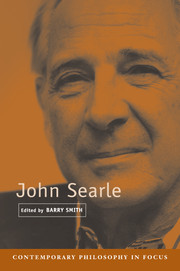Book contents
- Frontmatter
- Contents
- List of Contributors
- 1 John Searle: From Speech Acts to Social Reality
- 2 From Speech Acts to Speech Activity
- 3 Intentions, Promises, and Obligations
- 4 Law
- 5 Action
- 6 Consciousness
- 7 The Intentionality of Perception
- 8 Sense Data
- 9 The Limits of Expressibility
- 10 The Chinese Room Argument
- 11 Searle, Derrida, and the Ends of Phenomenology
- Further Reading
- Index
- References
1 - John Searle: From Speech Acts to Social Reality
Published online by Cambridge University Press: 05 June 2012
- Frontmatter
- Contents
- List of Contributors
- 1 John Searle: From Speech Acts to Social Reality
- 2 From Speech Acts to Speech Activity
- 3 Intentions, Promises, and Obligations
- 4 Law
- 5 Action
- 6 Consciousness
- 7 The Intentionality of Perception
- 8 Sense Data
- 9 The Limits of Expressibility
- 10 The Chinese Room Argument
- 11 Searle, Derrida, and the Ends of Phenomenology
- Further Reading
- Index
- References
Summary
It was in the Oxford of Austin, Ryle, and Strawson that John Searle was shaped as a philosopher. It was in Oxford, not least through Austin's influence and example, that the seeds of the book Speech Acts, Searle's inaugural magnum opus, were planted. And it was in Oxford that Searle acquired many of the characteristic traits that have marked his thinking ever since. These are traits shared by many analytic philosophers of his generation: the idea of the centrality of language to philosophy; the adoption of a philosophical method centred on (in Searle's case, a mainly informal type of) logical analysis; the respect for common sense and for the results of modern science as constraints on philosophical theorizing; and the reverence for Frege, and for the sort of stylistic clarity that marked Frege's writings.
In subsequent decades, however, Searle has distinguished himself in a number of important ways from other, more typical analytic philosophers. While still conceiving language as central to philosophical concerns, he has come to see language itself against the background of those neurobiological and psychological capacities of human beings that underpin our competencies as language-using organisms. He has embraced a radically negative stand as concerns the role of epistemology in contemporary philosophy. And he has braved territory not otherwise explored by analytic philosophers in engaging in the attempt to build what can only be referred to as a Grand Philosophical Theory.
- Type
- Chapter
- Information
- John Searle , pp. 1 - 33Publisher: Cambridge University PressPrint publication year: 2003
References
- 42
- Cited by

